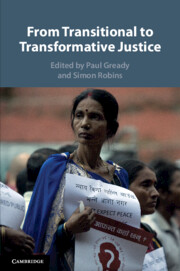Book contents
- From Transitional to Transformative Justice
- From Transitional to Transformative Justice
- Copyright page
- Contents
- Figures
- Tables
- Notes on Contributors
- 1 Introduction
- Part I Theories and Contexts
- Part II Building Bridges
- Part III New(er) Directions
- 9 Connecting the Egregious and the Everyday
- 10 Participation and Transformative Justice
- 11 The Restitutional Assemblage
- 12 Indivisibility as a Way of Life
- 13 HIJOS
- 14 Conclusion
- Index
9 - Connecting the Egregious and the Everyday
Addressing Impunity for Sexual Violence in Sri Lanka
from Part III - New(er) Directions
Published online by Cambridge University Press: 08 February 2019
- From Transitional to Transformative Justice
- From Transitional to Transformative Justice
- Copyright page
- Contents
- Figures
- Tables
- Notes on Contributors
- 1 Introduction
- Part I Theories and Contexts
- Part II Building Bridges
- Part III New(er) Directions
- 9 Connecting the Egregious and the Everyday
- 10 Participation and Transformative Justice
- 11 The Restitutional Assemblage
- 12 Indivisibility as a Way of Life
- 13 HIJOS
- 14 Conclusion
- Index
Summary
- Type
- Chapter
- Information
- From Transitional to Transformative Justice , pp. 191 - 214Publisher: Cambridge University PressPrint publication year: 2019
- 3
- Cited by

